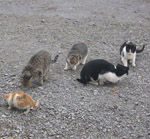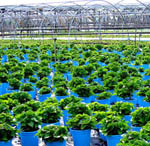Study finds wildlife-friendly oil palm plantations not very wildlife friendly
 A newly planted oil palm plantation. Image credit, Wakx.When it comes to species conservation, wildlife friendly oil palm plantations are not very friendly - at least for birds - as a new study in the journal Conservation Letters finds.
A newly planted oil palm plantation. Image credit, Wakx.When it comes to species conservation, wildlife friendly oil palm plantations are not very friendly - at least for birds - as a new study in the journal Conservation Letters finds.
Oil palm plantations, developed largely in Indonesia and Malaysia have led to sharp declines in biodiversity in some of the most biologically important areas of the world.
It has been proposed that oil palm plantations could be made more ecologically sustainable by incorporating wildlife friendly techniques like retaining fragments of forest to provide species habitat and corridors.
To test the potential conservation value of the "wildlife friendly" approach, David Edwards and fellow researchers measured bird species richness and abundance at sites in oil palm plantations and adjacent forest fragments in Borneo. They also sampled birds at sites in nearby contiguous forest that was subject to logging.
They found that forest fragments had 60-times less abundance of birds of high conservation priority and 1.8 times fewer birds overall compared to contiguous forest. Oil palm plantations fared worse with 200-times less abundance of priority birds than intact forest.
Species richness was also lower in plantations and fragments than contiguous forest. Furthermore, the researchers were not able to find evidence that adjacent forest fragments increased the number of birds within plantations.
These findings show that efforts to make palm oil plantations "wildlife friendly" are unlikely to have much effect on decreasing their negative impact on biodiversity. The findings also provide support for taking a "land sparing" approach to oil palm plantations.
The "land sparing" argument says that where agricultural production occurs, it should be intensified as much as possible to minimize the amount of land needed which in turn will enable us to maximize the amount of land we can protect in other areas. This contrasts with the wildlife friendly farming approach, which says that we should integrate wildlife conservation elements into agricultural systems even if it comes as a cost to production.
The authors argue that species conservation might be better off if small forest fragments adjacent to palm plantations were converted to palm and contiguous forests in other locations were protected instead. They write,
"Since palm-oil companies are currently expending funds to make existing oil palm plantations more wildlife friendly we suggest that these funds should be directed toward a biobanking scheme (e.g., that protects contiguous forest outside the agricultural matrix."
--by Rob Goldstein
Edwards, D., Hodgson, J., Hamer, K., Mitchell, S., Ahmad, A., Cornell, S., & Wilcove, D. (2010). Wildlife-friendly oil palm plantations fail to protect biodiversity effectively Conservation Letters DOI: 10.1111/j.1755-263X.2010.00107.x




 Birds
Birds
Reader Comments